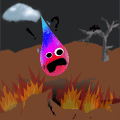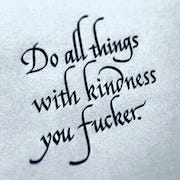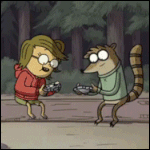|
 Effortpost alert Effortpost alert  For some reason English speaking people seem to be afraid of anything translated from another language. I've seen that in my (ex)bookshop and working with publishers, but I sure hope you can prove me wrong with some great talks about possibly coloured dead authors! For this thread I use the horribly Anglo-centric definition of world literature as stuff originally not written in English. So anything that's not covered by Booker prize, basically. No genre novels or pre-20th century things, please. I read all of that, too, but it would derail the thread horribly. To start the discussion every week or so I'll post an overview of the main writers from some region of the world. If you're interested in translated fiction you'll probably know these guys, but there's nothing to stop you from discussing more obscure authors or simply other great novelists from the hundreds that are available in English. I'll start with Southern Europe, because I live in Spain now and have been focusing on that stuff more recently. Portugal: Fernando Pessoa. Mainly worked as a poet, but now his most famous work is probably The Book of Disquiet: a 'factless autobiography', i.e., a very loosely related series of hundreds of vignettes? miniatures? prose poems? that were found in a trunk after his death. Jose Saramago. Won the Nobel prize in 1998, wrote a lot of novels with very interesting setups and symbols as well as long sentences. Blindness, for example, is the story of a mass blindness that affects almost everyone in a city. The Year of the Death of Ricardo Reis is about beforementioned Pessoa, whose 'heteronym' Ricardo Reis (Pessoa had written a fictional biography for him as well as many poems with than name) comes to Lisbon after finding out about the death of Pessoa. Good stuff all around. Spain: Federico García Lorca. The most famous Spanish poet and a playwright of XX century. His plays are quick and very powerful reads, so get a collection of them. Javier Marías. Proust-like sentences and insight coupled with a bit more of an openness to the outside world. Your Face Tomorrow trilogy will keep you busy for years if you like rereading stuff. He's also the king of the island of Redonda Juan Goytisolo. Hates capital letters, punctuation marks and straightforwardness. Likes satire and surrealism. Marx Family Saga is about resurrected Karl and Jenny Marx in the modern world. Italy: Italo Calvino. The master of metafiction and postmodern games. Much more readable than it sounds. Invisible Cities might be his most beautiful work, Cosmicomics is his wildest creation and If on a Winter's Night is the classic of postmodernism. It also inspired Sting!!! Primo Levi. Yes, Holocaust memoirs If This is a Man & The Truce. But also very imaginative short stories somewhat about chemistry The Periodic Table. Umberto Eco. Famous for his thick postmodern historical adventure novels The Name of the Rose & Foucault's Pendulum as well as essayistic explorations of beauty, love of lists and who knows what else Greece: Nikos Kazantzakis. Would've won the Nobel prize, but he lost to Camus by one vote and then died. I hope you're interested in Christianity and lives of workers, because that's what you'll get with Zorba the Greek and The Last Temptation of Christ. He didn't do the movies. Apostolos Doxiadis. He wrote a very good and fun novel about mathematics (Uncle Petros and Goldbach's Conjecture), what more do you need? Well, there's also Logicomix - a touching comic about Bertrand Russell's life especially for Stravinsky. Good links: https://www.complete-review.com looks terrible but has a fuckton of reviews and daily updated world lit news blog. http://www.rochester.edu/College/translation/threepercent/ posts reviews and fun rants about the lack of translations and  http://www.worldliteratureforum.com/ you can talk about world lit here as well, but why would you if you have this thread?
|
|
|
|

|
| # ? Apr 24, 2024 21:44 |
|
This is a cool thread, I'm looking forward to your analysis of some other countries as there are a bunch of countries I know nothing about. Of the countries you mentioned, I only read Eco, Dante, Miguel De Cervantes, Saramago, Zafon and Arturo Pérez-Reverte. Saramago's Blindness surprised me as I didn't expect a horror story, but it kinda is. It's some weird mix of magical realism and horror really. Zafon is easily the most famous Spanish author here (as in "within my group of friends") with his book The Shadow of the Wind. By a pretty big margin as well. Of the books I read in that genre I consider Shadow of the Wind one of the better ones, but I'm still not very motivated to read his other books to be honest. The Flanders Panel of Perez-Reverte was poo poo with the exception of the chess puzzle. edit: typo Walh Hara fucked around with this message at 11:28 on Aug 10, 2014 |
|
|
|
I had bought a book by Perez-Reverte some years ago thinking that I can't go wrong with an old fashioned adventure novel. I never got around to reading it because my ex stopped after 50 pages declaring it poo poo, so I decided not to bother. Zafon seems to be the current hot item everywhere. In my bookshop it was selling as much as Paolo Coelho books, which did make me suspicious. But people I trust have liked him, so I might get around to it. Here in his native Barcelona he seems to have a reputation as a bit of an rear end in a top hat, but I think that has more to do with political than literary stuff.
|
|
|
|
Here is a cross post from the "Read Literature" thread. Burning Rain alerted me to the existence of this thread, which is probably a better place for it. For readers of obscure Eastern European literature, Modernist writing and avant-garde literature (with a handful of classic reprints) check out Dalkey Archive, publisher of literature and literary criticism, most of it in translation. I guarantee that no one here (including me) has even heard of 20% of these authors, let alone read them. There is some pretty amazing stuff here and a lot of unreadably pretentious stuff. Check it out here: http://www.dalkeyarchive.com/browse-by-author/ If you want some guidance as to what you might like, check out this website which has a load of reviews (not just Dalkey titles): http://quarterlyconversation.com/category/reviews Looking forward to BR's analysis and advice.
|
|
|
|
It kind of sucks that this thread excludes anything pre-twentieth century because it means we can't discuss the works which were an inspiration to some of the authors in this thread. Cervantes, for example, is perhaps the most influential Spanish writer in history, and if you're going to read Spanish lit (or any literature, since there are references to Don Quixote in virtually everything in every language ever written after it) you would do well to get Don Quixote under your belt. E: Also, Eco led me to Borges and I HIGHLY RECOMMEND his short story Tlön, Uqbar, Orbis Tertius because it is one of the funniest and most entertaining things I have ever read. It's only like 17 pages long and you will not regret it. The Doctor fucked around with this message at 17:21 on Aug 10, 2014 |
|
|
|
The Doctor posted:Also, Eco led me to Borges and I HIGHLY RECOMMEND his short story Tlön, Uqbar, Orbis Tertius because it is one of the funniest and most entertaining things I have ever read. It's only like 17 pages long and you will not regret it. I suddenly keep seeing that recommended all over the Internet and it's been on my "to read" list for a while now. Anything else by Borges you would recommend?
|
|
|
|
I can't really recommend anything else because the mention of Eco in this thread is what led me to begin reading Borges this morning. I have been completely engaged with Labyrinths, a collection of his short stories, for the past few hours. So far all of it is really good. A recurring theme in what I have read so far is the idea that there isn't one reality or present, but infinite paths wherein infinite outcomes occur. Put simply, today you wake up and eat a bagel, or an egg instead, or you don't wake up and you die instead, or you wake up and ???, etc. etc. The one I just finished reading is a really funny story called Pierre Menard, Author of the Quixote (this is what I was saying about Cervantes being everywhere...) which is about (spoiler) a guy who re-writes Don Quixote 300 years later, except it's exactly the same as Cervantes wrote it word for word. How the story is interpreted is changed based on the differences between Cervantes/Menard as people themselves and even though he writes exactly the same thing it becomes something different. Once you "get" Borges after the first couple of stories (or lines, depending on how quickly you catch on...) he becomes a lot easier to read and a lot funnier.
|
|
|
|
metricchip posted:Anything else by Borges you would recommend? If you like Borges's "Fictions" enough I would move up to "Collected Stories" because most of his stories are along the lines of "Fictions". Borges is very intellectually enjoyable - and he is worshipped by critics because of this detached, ludic quality - but rarely does he ever move you emotionally. He might cause you to think about a situation or a way of thinking or a social convention which make you reassess your outlook but he's never going to move you to tears. There is also a "Collected Poems" and "Collected Essays" which I have seen but haven't read.
|
|
|
|
Josef K. Sourdust posted:If you like Borges's "Fictions" enough I would move up to "Collected Stories" because most of his stories are along the lines of "Fictions". Borges is very intellectually enjoyable - and he is worshipped by critics because of this detached, ludic quality - but rarely does he ever move you emotionally. He might cause you to think about a situation or a way of thinking or a social convention which make you reassess your outlook but he's never going to move you to tears. No tears yet, but in my brief experience with Borges I would not say that he is a completely detached writer. The Garden of Forking Paths is very emotional and evocative.
|
|
|
|
Yes, perhaps that was a bit harsh. Maybe what I should have said is that I am disappointed he seems to write predominantly in one register and doesn't have the range that I relish in the very best of writers. What Borges does, he does wonderfully.
|
|
|
|
Josef K. Sourdust posted:If you like Borges's "Fictions" enough I would move up to "Collected Stories" because most of his stories are along the lines of "Fictions". Borges is very intellectually enjoyable - and he is worshipped by critics because of this detached, ludic quality - but rarely does he ever move you emotionally. He might cause you to think about a situation or a way of thinking or a social convention which make you reassess your outlook but he's never going to move you to tears. YOu need to read more Borges if you think he is detached emotionally. Shakespeare's Memory has some really beautiful stories about Borges' later life, dealing with becoming blind and looking back and evaluating your worth. It's the most personal of his collections and while it's not as good as Fictions because nothing is it's still really good.
|
|
|
|
When I say Shakespeare's Memory I mean The Book of Sand and Shakespeare's Memory which come as a package deal in Penguin for some reason.
|
|
|
|
The Doctor posted:It kind of sucks that this thread excludes anything pre-twentieth century because it means we can't discuss the works which were an inspiration to some of the authors in this thread. Cervantes, for example, is perhaps the most influential Spanish writer in history, and if you're going to read Spanish lit (or any literature, since there are references to Don Quixote in virtually everything in every language ever written after it) you would do well to get Don Quixote under your belt. I think there's space for a dedicated classics thread (maybe along with a bookclub kind of thing? who knows), because people are probably more likely to have read them. I'm actually planning to re-read Don Quixote before too long, so I'd be interested in discussing about it as I go on. As for Borges, for some reason I haven't been able to connect with his stuff - maybe it's because I tried reading the English translation before my grasp of the language was strong enough for that. But this does make me want to give it another go...
|
|
|
|
Josef K. Sourdust posted:Here is a cross post from the "Read Literature" thread. Burning Rain alerted me to the existence of this thread, which is probably a better place for it. By the way, according to Open Letter data, these are the main publishers of original translated fiction appearing in the US: Dalkey Archive 41 AmazonCrossing 28 Europa Editions 16 Seagull Books 15 Penguin 13 Archipelago 10 Open Letter 10 Pushkin Press 9 FSG 8 They aren't counting new translations of classics, otherwise Penguin would probably be higher. But yeah, hardly any major press or their imprints are bothering with translations.
|
|
|
|
Burning Rain posted:By the way, according to Open Letter data, these are the main publishers of original translated fiction appearing in the US: In the early 2000's when I was buying a ton of books (which I have know sold most of to pay for my wedding rings since I am trying to switch to mostly ebooks) I always favored the Vintage International imprint (subset of Random House) because they always made gorgeous editions and you were always guaranteed to get an excellent translation. I believe they translate most of the major Japanese authors (Mishima, Kobo Abe, Murakami, Tanizaki), and a lot of the Russians. I also notice Orhan Pamuk (Turkish Nobel Prize winner) on the list. I highly recommend these editions especially if you can pick them up in a second hand store - when reading translated fiction, the translator really makes a huge difference in the quality of the work. I prefer Vintage translations to the Penguin translations any day. Honestly a lot of my translated stuff came from second hand book stores. There was a great imprint called Pantheon books that released some great modern translated stuff under the Pantheon Modern Writers Series that are I think out of print but great translations - Marguerite Duras, Simone de Beauvoir, Julio Cortazar, Michel Rio.
|
|
|
|
Poutling posted:In the early 2000's when I was buying a ton of books (which I have know sold most of to pay for my wedding rings since I am trying to switch to mostly ebooks) I always favored the Vintage International imprint (subset of Random House) because they always made gorgeous editions and you were always guaranteed to get an excellent translation. I believe they translate most of the major Japanese authors (Mishima, Kobo Abe, Murakami, Tanizaki), and a lot of the Russians. I also notice Orhan Pamuk (Turkish Nobel Prize winner) on the list. I highly recommend these editions especially if you can pick them up in a second hand store - when reading translated fiction, the translator really makes a huge difference in the quality of the work. I prefer Vintage translations to the Penguin translations any day. Honestly a lot of my translated stuff came from second hand book stores. There was a great imprint called Pantheon books that released some great modern translated stuff under the Pantheon Modern Writers Series that are I think out of print but great translations - Marguerite Duras, Simone de Beauvoir, Julio Cortazar, Michel Rio. Yes, I have quite a few Pantheon and Vintage International books myself and can vouch for the quality. I even liked going through the ads printed in the end of other translated stuff. (And your story about wedding rings raised my curiosity...) Anyway, here's another megapost - this time about Central/Western Europe. I'm from Eastern Europe myself, and I know how some of the ex-communist countries want to be seen as Western, but here it'll only be French, German and Dutch speaking countries, so no Czech Republic or Poland. France: George Perec was a member of Oulipo group who tried to create works using constrained writing techniques. His most famous work is Life: A User's Manual that's a multi-layered network of stories built according to a crazily detailed quasi-mathematical system (seriously, look at this: http://en.wikipedia.org/wiki/Life_A_User%27s_Manual#The_Knight.27s_Tour). It's a challenging book but more easy to read than something like Ulysses. Albert Camus with his buddy (or not) Jean-Paul Sartre are the cornerstones of existential philosophical literature - so much so that pretty much everybody has at least a vague idea of what "The Stranger" or "Nausea" is like. For purely literary enjoyment I would maybe recommend "The Plague" and "The Age of Reason" more, but they aren't as fun to discuss as previously mentioned ones. Michel Houellebecq (I almost wrote his name correctly the first time around!) - Wikipedia notes that "literary critics have labeled Michel Houellebecq's novels 'vulgar,' 'pamphlet literature' and 'pornography'", but I don't think there are many living French (or otherwise) authors that people are recommending to each other nearly as passionately as Houellebecq. "The Possibility of an Island" might be the best introduction: it's about a cloning cult with lots of philosophising about sex and other things. Benelux (without Luxembourg, sorry): Cees Nooteboom is pretty much the archetypical intellectual literary professor kind of a writer, but he's also won almost every award there is to win. I found "Rituals" too dry, but a lot of readers seem to love it. He's also known for his travel writing that is very different from mishaps-and-meeting-strangers orientated mainstream travel lit (basically, he talks about history of local architecture and his thoughts while looking at an old piece of pottery - in an interesting way, admittedly). Amelie Nothomb may seem like Belgian Joyce Carol Oates as she looks kinda goth and is writing a novel every year. The books range from autobiographical novels to stories about reality shows set in a concentration camp. They tend to focus on some really dark stuff, though her best known work "Fear and Trembling" is about losing face as a foreigner in Japan and much more straightforward than her other books. Germany: Thomas Mann has written some of the longest (The Buddenbroks & The Magic Mountain) and shortest (Death in Venice) novels/novellas from the authors I'm mentioning. They are often talked of as novels of ideas, but can be read as straightforward life-stories if you don't care about anything but plot (that's why I liked Magic Mountain even in my early teens). Hermann Hesse is often dismissed as an adolescent author with sometimes overtly preaching philosophical novels (Siddhartha, Steppenwolf), but his Glass Bead Game is very different - an amazing Borgesian novel about the nature of reality in a fantastical setting that doesn't really explain anything, but only gains from that. Günter Grass now, in his 80s, seems to mostly care about getting in the news and writing impossibly complex autobiographies, but after writing The Danzig Trilogy he can do pretty much whatever he wants, as far as I'm concerned. It's a symbolism-laden fictional overview of German history done in a sort of a magic-realist style with a lot of almost slapstick humour. Austria: Joseph Roth is often described as the chronicler of the decay in the Austro-Hungarian Empire. He talks about politicking among the aristocracy as well as the daily life of regular workers and loves using objects/songs that tie the whole thing together. Vargas Llosa has called Roth's "Radetzky March" as the best political novel of all time, but if you're not into that, I can also recommend "The String of Pearls". It's funny. And sad. Thomas Bernhard is talked about more and more as time goes on. He certainly seems very contemporary in his sensibilities, experimenting with the form and the ways of telling the stories and mixing tragical with absurd and farcical. Start with "The Losers" or "Woodcutters", but goons have mentioned other books as good starting points as well. Stefan Zweig was incredibly popular in his day, but now he's only mentioned as the guy on whose books Wes Anderson based "The Grand Budapest Hotel". He wrote a lot of biographies, history books and short stories, and maybe that's why his late reflective novella "The Chess Story" is read more than anything else of his. Switzerland: Friedrich Dürrenmatt probably heard a lot of people saying that his plays are as precise as Swiss watches and cut through in as many different ways as a Swiss knife and something about Swiss chocolate or maybe cows as well. "The Visit" is quite misanthropic, but not nearly as lifeless as Sartre could be at his bleakest. He was as much into strange parables as a lot of writers from German-speaking countries seem to be. Max Frisch was a playwright of absurd, black comedy plays often about emotionally challenged people stuck in the new world. If you don't like drama, "Homo faber" is his best known novel with very similar themes. I haven't mentioned Eugene Ionesco, Herta Müller, Milan Kundera, Franz Kafka and Elias Canetti who (have) lived a large part of their lives in these countries and/or wrote in German or French, because Central-Western Europe doesn't lack big, internationally recognized names anyway, and I'd rather leave them to prop up Eastern European literature that hasn't been translated to English nearly as much as German or French. Also, I have read most but not all of the guys mentioned above, so some of the descriptions are not based on my impressions. Burning Rain fucked around with this message at 11:11 on Aug 16, 2014 |
|
|
|
A few more names I'm familiar with this time around. I've read most of the works of Camus, Sartre, and Hesse, and I've read Death in Venice by Mann. I would say that you could just as easily label Camus and Sartre juvenile as you could Hesse. They all star kind of whiny male protagonists with existential issues and could easily be projections of the authors. I probably enjoyed Hesse more than I did Camus, at least more than The Stranger. I found The Stranger kind of muddled along for me until I got to the end, which was ten times more emotional and meaningful than I felt the rest of the book had been. Upon reflection I would say that my favourite work by Camus' is his interpretation of the Myth of Sisyphus.
|
|
|
|
Burning Rain posted:Yes, I have quite a few Pantheon and Vintage International books myself and can vouch for the quality. I even liked going through the ads printed in the end of other translated stuff. (And your story about wedding rings raised my curiosity...) I worked at a bookstore during college and had friends that also worked in second hand bookstores so between my discount and their discounts I managed to amass a massive collection of trade paperbacks to feed my insane lust for books. I live in a city where housing comes at a major premium, and when my now husband and I got engaged, he expressed that he didn't think it was feasible to store 20 boxes of books and keep moving them around. Anyone who loves books and has had to move a lot knows how lovely it is to have to lug around boxes of books. I take really immaculate care of my books so a lot of them are actually retail quality. My husband brought the books to a second hand bookstore and sold them all, and we made enough money to pay for our wedding rings (around a couple thousand). I actually think the bookstore owner had an orgasm when he saw what my husband had brought in.  I used to think that I'd regret switching to digital but it's actually quite freeing, not having all the books around. Also, vacations are much easier because instead of having to bring like 10 books with me when I go on vacation I can have 200 books on my ereader and it weighs a fraction of what my luggage did previously. Burning Rain posted:I haven't mentioned Eugene Ionesco, Herta Müller, Milan Kundera, Franz Kafka and Elias Canetti who (have) lived a large part of their lives in these countries and/or wrote in German or French, because Central-Western Europe doesn't lack big, internationally recognized names anyway, and I'd rather leave them to prop up Eastern European literature that hasn't been translated to English nearly as much as German or French. Also, I have read most but not all of the guys mentioned above, so some of the descriptions are not based on my impressions. You should talk about Kundera and Canetti at some point at the very least - I hope you mention them when you get to Eastern Europe. Kundera has kind of fallen out of favor and Canetti doesn't get read much these days but they are both excellent and deserve to have a comeback. Heinrich Boll is also worth mentioning in your Germany section. Also Marguerite Duras and Simone de Beauvoir for France. You don't see a lot of translated female authors so might as well mention some when you can!
|
|
|
|
For me the best of Camus is La Peste (The Plague). With Houellebecq I would start with Whatever because it seems the most straightforward and realistic of his novels. It gives you a good idea of his attitude although his later books are more complex. For French literature it is worth checking out the nouveau roman novelists, of which I know Robbe-Grillet best. I like Jealousy and The Erasers best. A Sentimental Novel is his last book, just published in English. It created a lot of controversy because it featured torture, rape and murder of children. All in the service of literature.  If you want to read Austrians be sure to check out Peter Handke. Very short books, which is nice. Not convinced by Nooteboom. Sebald-lite, surely? Josef K. Sourdust fucked around with this message at 22:21 on Aug 16, 2014 |
|
|
|
I'm not sure quite why you consider pre-20th century work to be a derail or off-limits? Emile Zola (France) was an incredible writer and Germinal in particular is a very powerful book. Also I strongly recommend the author Jean-Patrick Manchette. His books are arguably genre in that they could be described as crime thrillers, but they are really much more than that and involve quite a lot of history and criticism of French society. Three To Kill (Le Petit Bleu de la Côte Ouest ) is a great one. Josef K. Sourdust posted:If you like Borges's "Fictions" enough I would move up to "Collected Stories" because most of his stories are along the lines of "Fictions". Borges is very intellectually enjoyable - and he is worshipped by critics because of this detached, ludic quality - but rarely does he ever move you emotionally. Yeah I think you meant to say "rarely does he ever move me emotionally" since there are certainly people who are emotionally moved by his works, you just aren't one of them. Many of his later stories are quite sentimental, and he has quite a of of stories that are rather different both in structure and content from his work in Ficciones.
|
|
|
|
Josef K. Sourdust posted:A Sentimental Novel is his last book, just published in English. It created a lot of controversy because it featured torture, rape and murder of children. All in the service of literature. Probably less surprising if you knew anything about Robbe-Grillet beforehand - Vanity Fair recently had an article on his widow ("if you haven’t heard of Catherine Robbe-Grillet, you haven’t been Googling “dominatrix” enough"): quote:A year later, he directed her to a small five-page scroll tied with a red ribbon that he had left in a secret compartment of her writing bureau. There she found a handwritten document that he had written in perfect literary French titled Contrat de Prostitution Conjugale (Contract for Conjugal Prostitution), which outlines, in eight detailed points, exactly what he would require for their sadomasochistic sessions.
|
|
|
|
metricchip posted:I suddenly keep seeing that recommended all over the Internet and it's been on my "to read" list for a while now. Anything else by Borges you would recommend? This short story collection The Aleph. And I especially liked Averroes' Search for some reason.
|
|
|
|

|
| # ? Apr 24, 2024 21:44 |
|
Also for Eastern/Central Europe I would recommend Géza Gárdonyi, probably the best known author in Hungary. His works are right around the edge of 20th century/pre-20th but I think his best work is Slave of the Huns which was first published in 1901. It hooked me from the first page in which a weeping father sells his son into slavery in Byzantine Thrace, and from there we follow the son as he grows up and comes across a few guys such as Priscus and Attila the Hun. I thought it a good historical novel.
|
|
|















